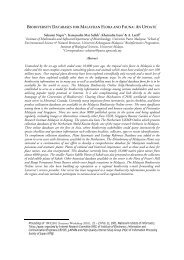o_19ko2dt161ng2j4e1tgnoqv1s45a.pdf
Create successful ePaper yourself
Turn your PDF publications into a flip-book with our unique Google optimized e-Paper software.
OVERVIEW OF INSECT BIODIVERSITY RESEARCH IN PENINSULAR MALAYSIA<br />
CURRENT AND FUTURE NEEDS FOR INSECT DIVERSITY<br />
RESEARCH IN MALAYSIA<br />
As in most other countries, economically important insect pest species have been an important<br />
area of research in Malaysia. Research has often been driven by the need to develop management<br />
strategies for such pest species, thus, studies on insect control were highest in frequency in the<br />
institutions surveyed. Insect diversity studies ranked second in number. However, many utilised<br />
indices of diversity (e.g., Simpson’s D & E and the Shannon diversity index) to measure<br />
biodiversity richness (or poorness). In many such studies, specimens are sorted based on<br />
phenotypes (termed “recognisable taxonomic units”) to obtain diversity indices for different<br />
study areas. While this method allows for the comparison of animal or plant richness, it does<br />
little to enable the understanding of biological and ecological systems.<br />
At the heart of understanding biological and ecological systems in an ecosystem is the<br />
understanding of the species that make up the diversity of the ecosystem, and the interactions<br />
of these species with other each other and with their environment. Such an understanding is<br />
only made possible through taxonomic work that enables us to identify species and provides<br />
a foundation upon which we can build on our knowledge of their biology, behaviour and<br />
ecological functions. In spite of this, taxonomic studies were poorly represented in the<br />
institutions surveyed, ranking last in number among mainstream areas of research such as<br />
diversity, ecology and biology.<br />
The few studies on insect taxonomy that have been conducted in the country have primarily<br />
been on specific insect groups. Many insect groups have been poorly researched. The<br />
Hymenoptera, Diptera and Hemiptera, to name a few, are taxonomically diverse groups, yet<br />
there are no monographs on these insect groups in Malaysia. The Collembola and Thysanura<br />
are also poorly researched insect groups. Although small and rarely noticed, they are important<br />
in terrestrial ecosystems. Collembolans, for example, help in decomposition and nutrient cycling<br />
in the soil, while thrips are thought to be important pollinators of dipterocarp trees.<br />
Taxonomists shoulder the responsibility of documenting organic diversity, and their skills are<br />
also needed in many ecological studies. In addition to their role in documenting species,<br />
taxonomists also usually ensure the proper curation and maintenance of valuable reference<br />
collections, as well as work on the systematics of the groups of organisms they study. The<br />
field of systematics, which is an extension of taxonomy, analyses relationships between<br />
organisms and discusses origins or causes of diversity. Research on systematics can often<br />
indirectly provide more information on the biological and ecological interactions of species<br />
than studies on diversity, yet it has rarely been pursued as a subject of research in the institutions<br />
surveyed. The dearth of taxonomic or systematic studies on insects is a serious cause for<br />
worry; our limited capacity to identify insects inadvertently limits our capacity to document at<br />
least three quarters of our country’s biological diversity.<br />
CONCLUSION<br />
The dearth of taxonomic information on the majority of insect orders in Peninsular Malaysia<br />
is a matter of great concern, because one of the prerequisites in any effort to conserve species<br />
is that they need to be identified and described. Most insect orders remain poorly studied in<br />
126



